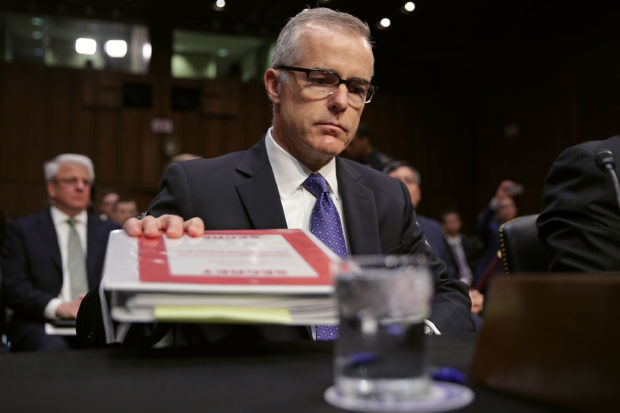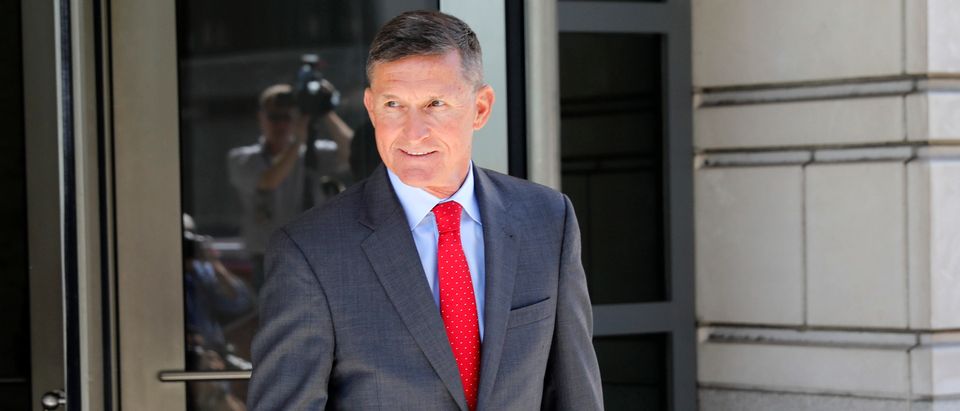- A leak of details of Michael Flynn’s phone call with a Russian diplomat likely did not originate from an “unmasking” request, according to two former U.S. law enforcement officials.
- Andrew McCabe, the former deputy director of the FBI, also explained in his book and congressional testimony that Flynn’s identity was not masked in intelligence reports of phone calls he had with Sergey Kislyak.
- A Washington Post columnist published a story in early 2017 based on a leak of classified information regarding the Flynn-Kislyak phone call.
- A list of Obama-era officials who made unmasking requests for Flynn failed to address who obtained information about the call.
A leak of classified information to the media regarding Michael Flynn’s phone calls in late 2016 with a Russian diplomat was likely not derived from a so-called “unmasking” request, according to analysis from two former U.S. law enforcement officials, and a review of newly released government documents.
Republicans have for over three years suggested that requests that Obama administration officials made for information on Flynn during the presidential transition period were somehow tied to the leak provided to The Washington Post for a Jan. 12, 2017, story about Flynn’s phone calls with Sergey Kislyak, a Russian diplomat.
Post columnist David Ignatius reported that a “senior U.S. government official” said Flynn spoke by phone with Kislyak, the then-Russian ambassador, about U.S. sanctions against Russia.
The story touched off of a series of events that eventually led to charges against Flynn for making false statements to the FBI. The Justice Department filed a motion to toss out the case, citing evidence that the FBI withheld information from Flynn’s lawyers. Attorney General William Barr defended Flynn’s call with Kislyak in a May 8 interview as “laudable” and said the former national security adviser was the target of an FBI “perjury trap.”
Republicans upset at the leak of the Flynn story to the Post have pushed for the declassification of a list of Obama-era officials who submitted requests for intelligence reports regarding Flynn. One hope was that the list of “unmasking” requests might shed light on which Obama administration official was behind the leak to the Post, or at least narrow down a list of possible culprits.
But those hopes were dashed May 13 with the release of the list, which included the names of 39 government officials, including Joe Biden, James Clapper and James Comey. The timeline of the unmasking requests did not match up with the date of Flynn’s phone call with Kislyak — Dec. 29, 2016.
Clapper, who served as director of national intelligence, made a request a day earlier, on Dec. 28, 2016. The next request was not made until White House Chief of Staff Denis McDonough did so on Jan. 5, 2017. Government officials were discussing Flynn’s call with Kislyak between the dates of the Clapper and McDonough requests, suggesting that Flynn was identified in a report that did not require his identity to be unveiled. (RELATED: Here Is What You Need To Know About ‘Unmasking’ And Michael Flynn)
A theory gaining traction this week is that Flynn was never actually masked in intelligence reports that served as source material for the leak.
Andrew McCarthy, a former federal prosecutor, and Mark Wauck, a former FBI special agent, offered up theories this weekend to explain how U.S. officials might have learned of Flynn’s call with Kislyak if not through an unmasking request.
Former FBI Deputy Director Andrew McCabe, in congressional testimony and in his autobiography, also suggested that Flynn was not “unmasked” in a transcript of phone calls he had with Kislyak.
Text messages that former FBI officials Peter Strzok and Lisa Page exchanged while they still worked at the bureau also suggested that Flynn’s identity was not masked in an intelligence report of the call with Kislyak.

Former Acting FBI Director Andrew McCabe (Alex Wong/Getty Images)
Wauck, the former FBI special agent, proposed on his blog that Flynn was not masked in the first place since he was the target of an ongoing counterintelligence investigation. The FBI had Flynn under a counterintelligence investigation since Aug. 16, 2016.
Wauck wrote that intelligence analysts mask the identities of American citizens if they are initially thought not to be of intelligence value. But being the target of a counterintelligence investigation would likely mean that his name would not be masked in intelligence reports.
“The simple explanation … is because the FBI’s Washington Field Office had a Full Investigation open on Flynn — therefore no masking,” Wauck wrote on his blog on Sunday.
McCarthy, the former prosecutor, proposed a similar theory about the unmasking of Flynn in a column Sunday at the National Review.
“Instead, his December 29 call with Kislyak was likely intercepted under an intelligence program not subject to the masking rules, probably by the CIA or a friendly foreign spy service acting in a nod-and-wink arrangement with our intelligence community,” McCarthy offered.
Wauck doubts that the CIA or another foreign government provided the information on the Flynn-Kislyak call. He instead speculated that the information on the call was obtained through an electronic surveillance — a FISA — on the Russian embassy.
The key is a reference that McCabe made during his House Intelligence testimony to “tech cuts,” he said. Wauck said that the term in FBI parlance refers to the typed summaries of Flynn’s conversation with Kislyak.
“What that fact means is precisely that the FBI got the details of the Flynn/Kislyak conversation off the FISA that targeted the Russian Embassy,” Wauck wrote.
There are several clues found in publicly released government documents suggesting that Flynn was not unmasked in a report about the Kislyak phone call.
McCabe’s testimony to the House Intelligence Committee on Dec. 19, 2017, suggested that the FBI’s intelligence on Flynn did not have his name masked.
“So no transcript or summary of Flynn’s conversations with Kislyak that were ever masked, and therefore, there were no unmasking requests that could have been made for these nonexistent reports,” McCabe was asked during his interview.
“I think your description is accurate,” said McCabe. “It’s probably a misnomer to refer to it as a product. It wasn’t an intelligence product as we use that term.”
“I do not believe that that summary was ever masked. I’m also not familiar with any requests that we received to unmask anything. I’m not — l’m not aware that, if we got one, it would strike me as unnecessary if nothing was masked.”
McCabe also described in his book, “The Threat,” how the FBI obtained information about Flynn’s call with Kislyak.
He wrote that government officials who create the presidential daily brief issued a request to the intelligence community for any information regarding why the Russian government did not retaliate against the United States for the sanctions.
“In response to that request, the FBI queried out own holdings. We came across information indicated that General Mike Flynn, the president-elect’s nominee for the post of national security adviser, had held several conversations with the Russian ambassador to the U.S., Sergey Kislyak, in which the sanctions were discussed.”
McCabe said that he and officials in the FBI’s counterintelligence division had not been aware of the intelligence until an analyst provided it to him.
“I shared it with Comey; Comey shared it with the director of national intelligence, James Clapper; and Clapper verbally briefed it to President Obama,” McCabe wrote.
Peter Strzok, the FBI’s top investigator on Crossfire Hurricane, also suggested in text messages with FBI lawyer Lisa Page that the Flynn-Kislyak information was not derived from an unmasking request.
“[Priestap], like us, is concerned with over sharing. Doesn’t want Clapper giving CR cuts to WH. All political, just shows our hand and potentially makes enemies,” Strzok wrote to Page on Jan. 3, 2017.
“CR” is believed to refer to Crossfire Razor, the FBI’s code name for Flynn. Priestap is Bill Priestap, who served as chief of FBI counterintelligence.
Strzok indicated in another 2017 text that the narrative of Flynn being masked in a transcript was inaccurate.
“F*CK! Clapper and Yates through Graham questions are all playing into the ‘there should be an unmasking request/record’ for incidental collection incorrect narrative,” Strzok wrote Page on May 8, 2017, during a Senate Judiciary Committee hearing for Clapper and Sally Yates, the former deputy attorney general.
All content created by the Daily Caller News Foundation, an independent and nonpartisan newswire service, is available without charge to any legitimate news publisher that can provide a large audience. All republished articles must include our logo, our reporter’s byline and their DCNF affiliation. For any questions about our guidelines or partnering with us, please contact licensing@dailycallernewsfoundation.org.












